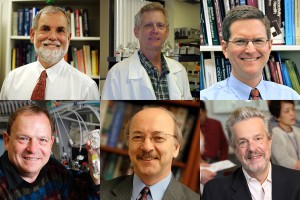AAAS names ’SC scientists as fellows
Six USC scientists were named fellows by the American Association for the Advancement of Science, a nonprofit organization that publishes the peer-reviewed journal Science.

Honored · The American Association for the Advancement of Science has recently elected six USC professors as fellows for their work in biology. – Photos courtesy of USC Dornsife and Keck School of Medicine
The AAAS 2013 elected fellows include Frank Gilliland, professor of preventive medicine; Robert Maxson Jr., professor of biochemistry and molecular biology; Rob McConnell, associate professor of preventive medicine; Kenneth Nealson, professor of earth sciences and biological sciences; Nicos Petasis, professor of chemistry and Berislav Zlokovic, professor of physiology and biophysics.
In an interview with the Daily Trojan, Gilliland and Maxson both said they felt honored by the title. Gilliland researches preventive medicine with a focus on conditions that plague Los Angeles. He started out as a doctor treating patients but said he wanted to prevent rather than simply treat diseases.
“I became more interested in preventing disease in the first place, and a bunch of environmentally related diseases are entirely preventable,” he said.
Gilliland said his group focused on children’s respiratory health, studying what environmental factors influence conditions such as asthma. Gilliland also researches obesity, a public health issue that is receiving a lot of attention in the scientific community.
“We’re finding that it’s not just calories in and calories out that is driving the obesity epidemic, and it appears that the environment plays an important role as well,” Gilliland said.
Despite the air pollution and obesity health concerns that still plague Los Angeles, Gilliland said that air quality has significantly improved in the last five to seven years. Gilliland said he has seen children’s health improve with reduced air pollution.
“It’s quite gratifying to see that the research that we’ve done has resulted in new policies, new regulations and reduced air pollution and we can show that it is resulting in improved health for the kids growing up here in Los Angeles,” Gilliland said. “So that’s even better than being a fellow.”
Both Gilliland and Maxson said that USC has a very collaborative working environment for scientists.
Maxson said he started at USC’s medical school in 1983 and had few colleagues to directly interact with. This prompted the small group of molecular biologists to work together through activities such as group meetings.
“There are not a lot of places that have that kind of camaraderie, where people really kind of care about each other and help each other,” Maxson said. “Other places where I’ve spent time, the doors are all closed and you don’t talk to the guy down the hall because there was some kind of rivalry.”
Maxson, who has worked at USC for 30 years, said he was fascinated by developmental biology after taking a class as an undergraduate.
“The overall question is how genes control different aspects of embryonic development.”
Maxson works with a specific cell population called the cranial neural crest. His group discovered the genetic basis for a birth defect called craniosynostosis, where the skull bones fuse together and cause an unusual skull shape.
“A lot of what we do is directly related to birth defects in humans,” Maxson said.
His group has also worked on the heart, studying defects in cardiac outflow. Maxson said that not all of his work has had obvious practical applications, though.
“The wonderful thing about science, it’s also something that’s very difficult about it, is that every day is different. You come into the lab and you have different problems to solve, but I think probably the biggest challenges are just operating in the funding environment in the U.S.,” Maxson said. “I’ve spent a lot of sleepless nights putting together grant proposals.”
